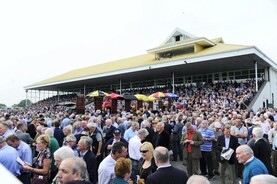If timing is everything, Irish racing has found quite the moment to descend into some in-fighting involving the country’s top National Hunt trainers.
A story that emerged in recent days looks set to roll and roll, as Ireland’s four leading jumps handlers are believed to have had legal representations made on their behalf to Horse Racing Ireland (HRI) over being restricted from a series of 60 races designed to benefit smaller stables next year.
The intention behind the series is completely understandable. In National Hunt racing, the gap continues to grow between those at the top of the picture and those further down the chain.
For example, in the 2003/04 National Hunt season in Ireland, a total of 16 different trainers saddled more than 20 winners over the course of the campaign. The top two in the table, Noel Meade and Willie Mullins, notched 77 and 70 winners apiece.
Fast forward 20 years to the season just gone, and only five trainers registered more than 20 winners in the campaign. The top two, Willie Mullins and Gordon Elliott, racked up a staggering 257 and 207 winners respectively in Ireland alone.
We are experiencing a major shift in dynamics compared to recent decades.
HRI approach
Against that landscape, it’s welcome that HRI has tried to help those further down the rankings. Their approach is to roll out races next year for trainers who have saddled less than 50 Irish National Hunt winners in either of the last two seasons.
The only four trainers ruled out of the races, due to their tally of winners, are Willie Mullins, Gordon Elliott, Henry de Bromhead and Gavin Cromwell.
For the greater good, perhaps these yards should be accepting of not being allowed to run in what averages out to be a little more than one race a week over the course of a year, but is it fair to penalise a trainer for being successful?
Perhaps designing this series of new races for lower-grade horses, which the top trainers do not have in such large quantities, would be a more amicable solution than shutting the door completely on our four most successful operators, but there is no perfect solution to address the growing imbalance in National Hunt racing.
One thing that is for certain, however, is that it does not look good to passing observers of the sport to see the top trainers arguing over a proposition designed to help smaller yards in the current climate.
This also comes in the same moment as public sentiment is at an all-time high to divert increased public funding from other avenues towards our brilliant Olympic athletes - and deservingly so.
It is not a good look for the thoroughbred sector to be at odds over anything that has a tie to government-supported prize money right now.






 This is a subscriber-only article
This is a subscriber-only article










SHARING OPTIONS: